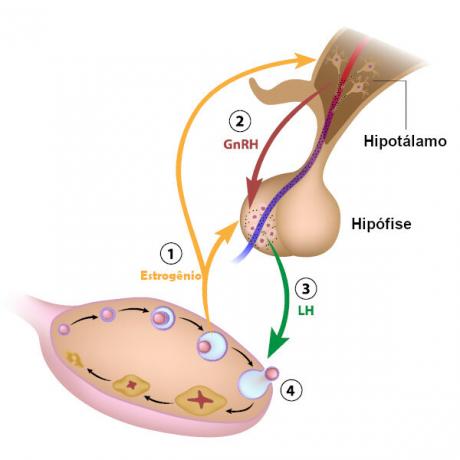hypothalamus is a region of the brain located just below the thalamus. It is a small region, but with great importance for the proper functioning of the organism, being considered the integrating link between the endocrine systems and nervous. The hypothalamus regulates thirst, appetite, temperature and blood pressure.
It is also responsible for producing hormones that stimulate and inhibit the action of hypophysis, acting, therefore, indirectly, in different structures of our body. The hypothalamus also produces hormones that are released by the neurohypophysis, antidiuretic hormone and oxytocin. Antidiuretic hormone ensures greater reabsorption of water by the kidneys, while oxytocin is related to the ejection of milk by the mammary glands and uterine contraction.
Read too: Thyroid — important gland of the endocrine system
Hypothalamus Summary
It's a small structure brain.
It performs a number of important functions in the body, such as regulating hunger, temperature and blood pressure.
It produces hormones that will be secreted by the neurohypophysis and inhibiting and releasing hormones that will act by controlling the secretion of hormones by the pituitary.
The hormones produced by the hypothalamus and secreted by the neurohypophysis are antidiuretic hormone and oxytocin.
Antidiuretic hormone promotes an increase in urine concentration, as it ensures greater water reabsorption by the kidneys.
Oxytocin promotes contraction of the uterus at the time of delivery and promotes milk ejection.
What is the hypothalamus?
The hypothalamus is a small region of the brain located belowdthe thalamus. It represents less than 1% of the brain mass, however, despite being a small region, it is of great importance for the organism. The hypothalamus is connected to the pituitary gland by a narrow rod called the infundibulum.
Do not stop now... There's more after the ad ;)
Functions of the hypothalamus
The hypothalamus is a region of the brain that has a number of important functions, being considered the integrative link between the endocrine system and the nervous system. Among the functions that can be attributed to the hypothalamus, we can highlight:
cardiovascular regulation (increase and decrease in blood pressure and increase and decrease in heart rate);
regulation of appetite and energy expenditure;
regulation of body water (controls the excretion of water in the urine and provides a sensation of thirst);
regulation of body temperature;
works in biological clock;
regulates milk ejection and uterine contraction at delivery;
plays a role in sexual and mating behavior;
initiates fight-or-flight response;
stimulates and inhibits the secretion of hormones by the pituitary.
Read too: Major endocrine glands and their hormones
Hormones produced by the hypothalamus

The hypothalamus is a structure in the brain that produces hormones that control pituitary secretion and hormones that are released by the pituitary. Initially, we will talk about the hormones synthesized by the hypothalamus and that control the action of the pituitary. These hormones are known as releasing and inhibiting hypothalamic hormones and are synthesized by special neurons in the hypothalamus. Are they:
Thyrotropin-releasing hormone (TRH): acts by stimulating the secretion of thyroid-stimulating hormone (TSH) and prolactin.
Corticotropin releasing hormone (CRH): promotes the release of adrenocorticotropic hormone (ACTH).
Growth hormone releasing hormone (GHRH): It works by guaranteeing the release of growth hormone.
Growth hormone inhibitory hormone (GHIH) (somatostatin): causes inhibition of growth hormone release.
Gonadotropin-releasing hormone (GnRH): causes the release of luteinizing hormone (LH) and follicle-stimulating hormone (FSH).
Dopamine or prolactin inhibitory factor (PIF): acts by inhibiting the release of prolactin.
In addition to releasing and inhibiting hormones, the hypothalamus produces: the antidiuretic hormone or vasopressin and oxytocin. Despite being synthesized by the hypothalamus, the two hormones will be released by the pituitary gland, more precisely by the neurohypophysis. Both hormones are polypeptides that have nine amino acids. See below the functions that can be attributed to these two hormones.
Antidiuretic hormone (ADH) or vasopressin: It is responsible for decreasing the volume of urine and increasing its concentration. This happens because this hormone promotes an increase in the permeability of the collecting tubules and ducts, causing more water to be reabsorbed.
oxytocin: acts on the contraction of uterus at the time of delivery, in addition, it promotes the ejection of milk by the mammary glands, a process that is stimulated by the baby's suction.
By Vanessa Sardinha dos Santos
Biology teacher
Would you like to reference this text in a school or academic work? Look:
SANTOS, Vanessa Sardinha dos. "Hypothalamus"; Brazil School. Available in: https://brasilescola.uol.com.br/biologia/hipotalamo.htm. Accessed on February 21, 2022.
